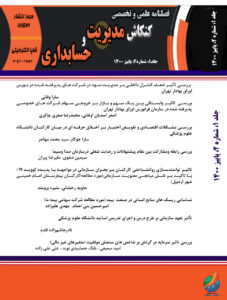مقاله: پژوهشی
صفحه: 365- 394
نویسندگان:
انسیه عبادی[1]
[1] کارشناس ارشد مدیریت دولتی
چکیده
تحقیق مورد مطالعه با هدف رابطه رهبری اخلاقی با عملکرد منابع انسانی با نقش میانجی و واسطهای سکوت سازمانی بررسی گردید. روش پژوهش توصیفی بوده و به لحاظ کاربردی در زمره تحقیقات همبستگی میباشد.جامعه آماری تحقیق را کارکنان اداره تامین اجتماعی که دارای مدرک تحصیلی فوق دیپلم هستند و تعداد آنها 483 هست، میباشند. برای نمونه گیری از روش نمونه گیری احتمالی و از نوع تصادفی ساده استفاده شد و از طریق جدول مورگان جریسی نمونهای به تعداد 215 انتخاب گردید و به این اندازه پرسشنامه تهیه و تنظیم شد و جهت بررسی روایی در اختیار اساتید دانشگاه در رشته مدیریت قرار داده شد و طی بررسیهای و مشاورت آنها تایید گردید و سپس پرسشنامه در بین اعضای نمونه توزیع گردید و نهایتا به تعداد 194 پرسشنامه تکمیلی و سالم توسط محقق جمعآوری گردید.پایایی ابزار نیز از طریق محاسبه ضریب آلفای کرونباخ در نرمافزار مورد تایید قرار گرفت. جهت تجزیه و تحلیل ابتدا از آمار توصیفی و از آمار استنباطی جهت بررسی و آزمون فرضیات استفاده شد نتایج نشان داد که رهبری اخلاقی با ضریب مسیر 68/0 و تی معناداری(T-Value)، 39/6 بر عملکرد منابع انسانی و با ضریب مسیر79/0 و با تی معناداری 13/17 برسکوت سازمانی تاثیرگذار میباشند. و از طرف دیگر سکوت سازمانی بر عملکرد منابع انسانی با ضریب مسیر43/0 و با تی معناداری 82/5 بطور عیرمستقیم تاثیرگذار است. در آخر پبشنهادت ارائه گردید.
کلمات کلیدی:
سکوت سازمانی، عملکرد منابع انسانی، رهبری اخلاقی و مدلیابی ساختاری
Ansiya Ebadi[1]
[1] Master of Public Administration
abstract
The study aimed to investigate the relationship between ethical leadership and human resource performance with the role of mediators and intermediaries of organizational silence. The research method is descriptive and is in the category of correlational research in terms of application. The statistical population of the study is the employees of the Social Security Administration who have a post-diploma degree and their number is 483. For sampling, a simple random probability sampling method was used and a sample of 215 was selected through the Morgan-Jersey table. A questionnaire was prepared and adjusted to this size and was provided to university professors in the field of management for validity examination and was approved during their reviews and consultations. Then the questionnaire was distributed among the sample members and finally 194 supplementary and healthy questionnaires were collected by the researcher. The reliability of the instrument was also confirmed by calculating the Cronbach’s alpha coefficient in the software. For analysis, descriptive statistics were used first and inferential statistics were used to examine and test hypotheses. The results showed that ethical leadership with a path coefficient of 0.68 and a significant T-Value of 39.6 has an impact on human resources performance and with a path coefficient of 0.79 and a significant T-Value of 13.17 on organizational silence. On the other hand, organizational silence has an indirect impact on human resources performance with a path coefficient of 0.43 and a significant T-Value of 82.5. Finally, a suggestion was presented.
Keywords:
Organizational silence, human resource performance, ethical leadership, and structural modeling
